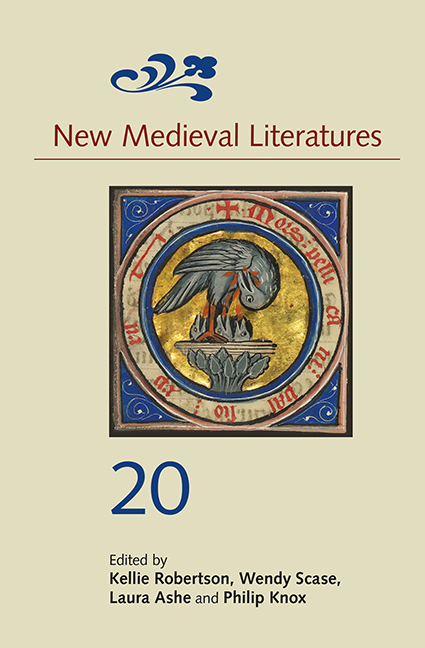Book contents
- Frontmatter
- Contents
- List of Illustrations
- List of Abbreviations
- 1 Lion-Keu-Coupé: A Missing Link in Yvain or Le Chevalier au Lion
- 2 John of Howden’s Rossignos and the Sounds of Francophone Devotion
- 3 ‘Wereyed on every side:’ Chaucer’s Troilus and Criseyde and the Logic of Siege Warfare
- 4 ‘Ave ave ave [ave]:’ The Multilingual Poetics of Exuberance in Bruder Hans
- 5 Performative Typology, Jewish Gender and Jesus’s Queer Romance in the York Corpus Christi Plays
- 6 Locating Charles d’Orléans: In France, in England and Out of Europe
- 7 Urinals and Hunting Traps: Curating Fifteenth-Century Pragmatic Books
4 - ‘Ave ave ave [ave]:’ The Multilingual Poetics of Exuberance in Bruder Hans
Published online by Cambridge University Press: 30 April 2020
- Frontmatter
- Contents
- List of Illustrations
- List of Abbreviations
- 1 Lion-Keu-Coupé: A Missing Link in Yvain or Le Chevalier au Lion
- 2 John of Howden’s Rossignos and the Sounds of Francophone Devotion
- 3 ‘Wereyed on every side:’ Chaucer’s Troilus and Criseyde and the Logic of Siege Warfare
- 4 ‘Ave ave ave [ave]:’ The Multilingual Poetics of Exuberance in Bruder Hans
- 5 Performative Typology, Jewish Gender and Jesus’s Queer Romance in the York Corpus Christi Plays
- 6 Locating Charles d’Orléans: In France, in England and Out of Europe
- 7 Urinals and Hunting Traps: Curating Fifteenth-Century Pragmatic Books
Summary
For St Paul was caught up into the third heavens.
For there he heard certain words which it was not possible for him to understand.
For they were constructed by uncommunicated letters.
For they are signs of speech too precious to be communicated for ever.
Christopher Smart (1722–1771), Jubilate AgnoThe complex phenomenon of multilingualism in texts of the Middle Ages has gained an increasingly important position in medieval literary studies. Building on – while moving beyond – the familiar dichotomy of Latin and vernacular, scholars have turned increasingly to branches of linguistics to help explain the expansive networks of languages and dialects which intersect to form each idiolect found within a particular medieval text. The quadrilingual poetic glossed Ave Maria prefacing Bruder Hans's Marienlieder, written in the 1390s, however, has rarely been considered in these studies. As an intricate example of a single author using four languages (German, Latin, French and English) in one poem, and its almost unique use of English as a poetic language on the Continent in the Middle Ages, its status has been curiously marginal. Perhaps it has been overshadowed in the critical literature because of its complex Marian devotion, or neglected because of its unconventional blending of the author's Ripuarian dialect with the more standard literary language of southern Germany. Operating at the intersection of theology and literary criticism, this chapter examines the motifs of linguistic excess and exuberant praise of Mary as they function within both the multilingual preface and the body of the poem. Hans employs what I term a ‘poetics of exuberance’ in an apparent attempt to exceed and escape language, even while drawing attention to the poem's intricate acrostic structure and the forms of its materiality. Writing at the crossroads of apophatic and cataphatic thought, his devotion extends not only to Mary and Jesus, the Annunciation and other miraculous events in their lives, but also to the very letters which constitute the Ave Maria – most especially, the mysterious properties of the three-lettered greeting Ave itself. Testing the outer limits of poetry's expressive capability through his complex multilingualism and at times rather unconventional symbolism, Hans seems to propose a simple trio of letters, Ave, as alone uniquely capable of redeeming the morass of otherwise fallen human languages.
Part of the significance of the poem, and of the study of medieval multilingualism more broadly, stems from its potential to aid us in moving beyond the linguistic boundaries that often parcel up medieval literature into closely guarded fiefdoms.
- Type
- Chapter
- Information
- New Medieval Literatures 20 , pp. 107 - 142Publisher: Boydell & BrewerPrint publication year: 2020



